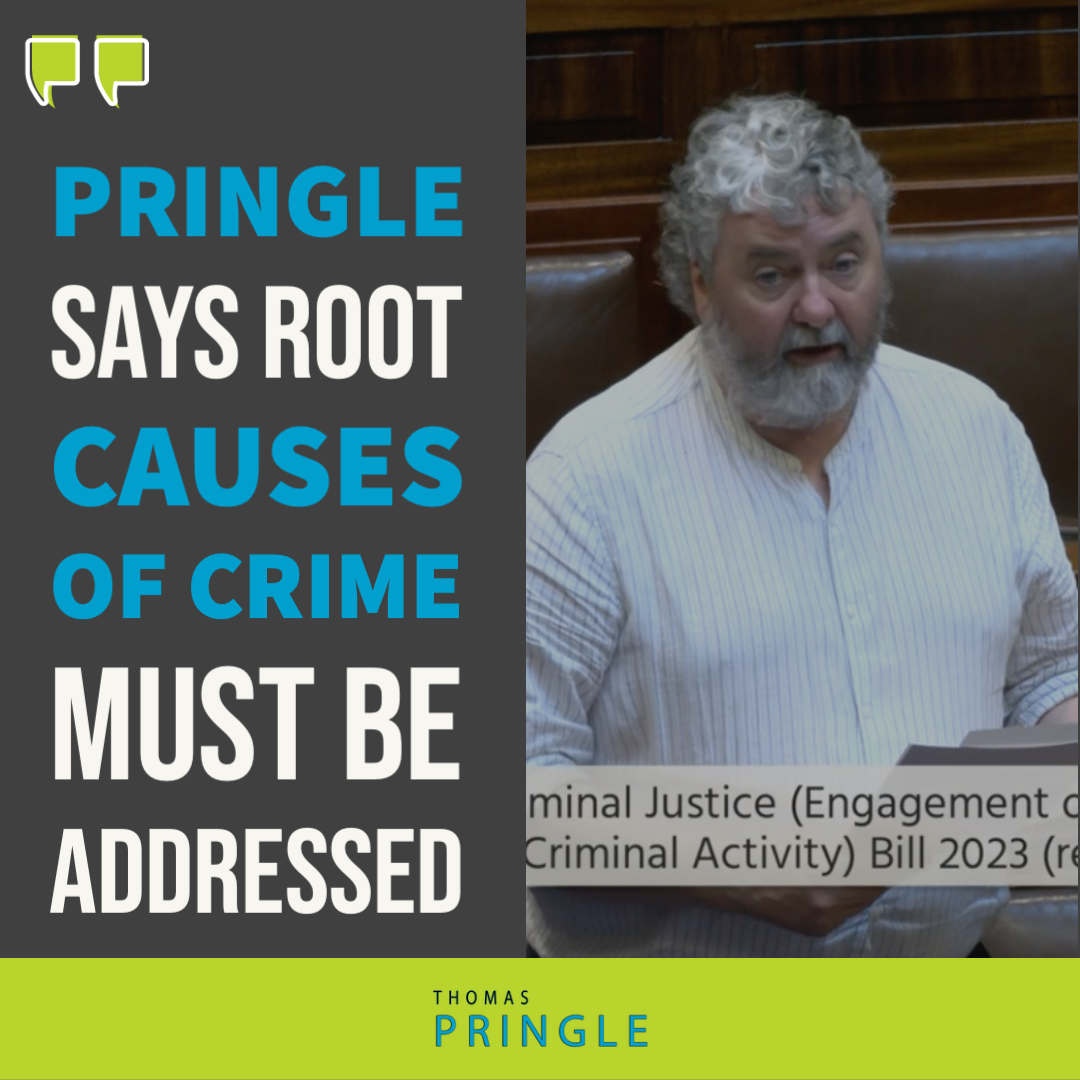- Pringle: We need a policy that recognises the importance of inshore fishing
- Pringle: Disabled people and carers face crisis of State neglect
- Pringle: Failed FF/FG housing policies forcing people to put their lives on hold
- Pringle welcomes Donegal council motion on Occupied Territories Bill: ‘We cannot stand by in the face of genocide’
Pringle says root causes of crime must be addressed
- Updated: 7th June 2023

Independent TD for Donegal, Thomas Pringle, has welcomed legislation to make recruiting a child to commit a crime an offense, and said the root causes of crime must also be addressed.
Addressing the Dáil recently, Deputy Pringle said: “The rise in the involvement of young people in crime is very concerning. Four hundred drug offences were committed by children and adolescents aged 10 to 17 in 2016 and that number has risen to approximately 1,000 in 2020. It is clear that legislation is needed to address this, but we can’t rely on legislation alone.
“Young people in this country shouldn’t face recruitment into crime and we should be doing all in our power to address this, not just at an urban level, but at a national level. The National Prevalence study 2017 has shown that the same issues were seen by Garda Juvenile Liaison Officers nationally and were not confined to urban areas.
“It is for this this reason that I support this bill’s intention to make it an offence for an adult to compel, coerce, direct or deceive a child for the purpose of causing the child to commit a crime and the intention to make it an offence to induce or invite a child to commit a crime,” he said.
The deputy was speaking last Thursday in support of Criminal Justice (Engagement of Children in Criminal Activity) Bill 2023, calling it, “a very important piece of legislation”.
He said a number of reports over the last two decades analysed the issue of children in Ireland being recruited to commit a crime and all underlined the need for legislative intervention.
Deputy Pringle said: “I think an important aspect of the legislation is that it is not a requirement for a child to intend to commit a crime or for a child to be prosecuted for an offence, for an adult to be charged in trying to engage the child in criminality. It is important that we intervene as early as possible and not wait until a child has actually committed a crime before an adult is prosecuted for their involvement.
“Another important aspect of this bill is that lower levels of criminality are involved. Facilitating earlier intervention by capturing lower levels of criminality that children may be recruited to engage in, before progressing to more serious offending, is extremely important.
“However, I believe we should also be looking at ensuring even earlier intervention than this. It has been reported time and time again that adults within the criminal network often recruit and groom certain vulnerable, local children to commit crime,” he said.
The deputy said: “It is important that we are getting to vulnerable young people before they are targeted and the [University of Limerick’s] Greentown report also recommended the design of a programme to include interventions with children and their families to help them withstand the influence of criminal networks.”
He said: “We need to start addressing the reasons young people might want to engage in crime. The ‘Juvenile Justice, Crime and Early Intervention’ study 2011 detailed the substantial social reasons for the involvement of children in criminal activity.
“It highlighted the ‘respect and validation that young people derived from their participation in gangs and criminal activity’. The reality is that in most cases the State has absolutely failed these young people and their communities, and in search of another structure that might support them and give them a sense of validation and dignity within their lives, a lot of young people turn to criminal gangs.”
Deputy Pringle said: “Again, I support this bill, but I think the age should be raised to at least 21. Eighteen is far too young, and as I said, legislation is not enough. We need to ensure that we are addressing the root cause of crime if we are serious about addressing this issue.
“The root cause of crime is not crime itself but the circumstances that force young people to consider crime as a way of advancement. Ultimately unless we address those issues, we will never see the reduction in lives being destroyed by involvement in crime or the causes of crime as well.”



